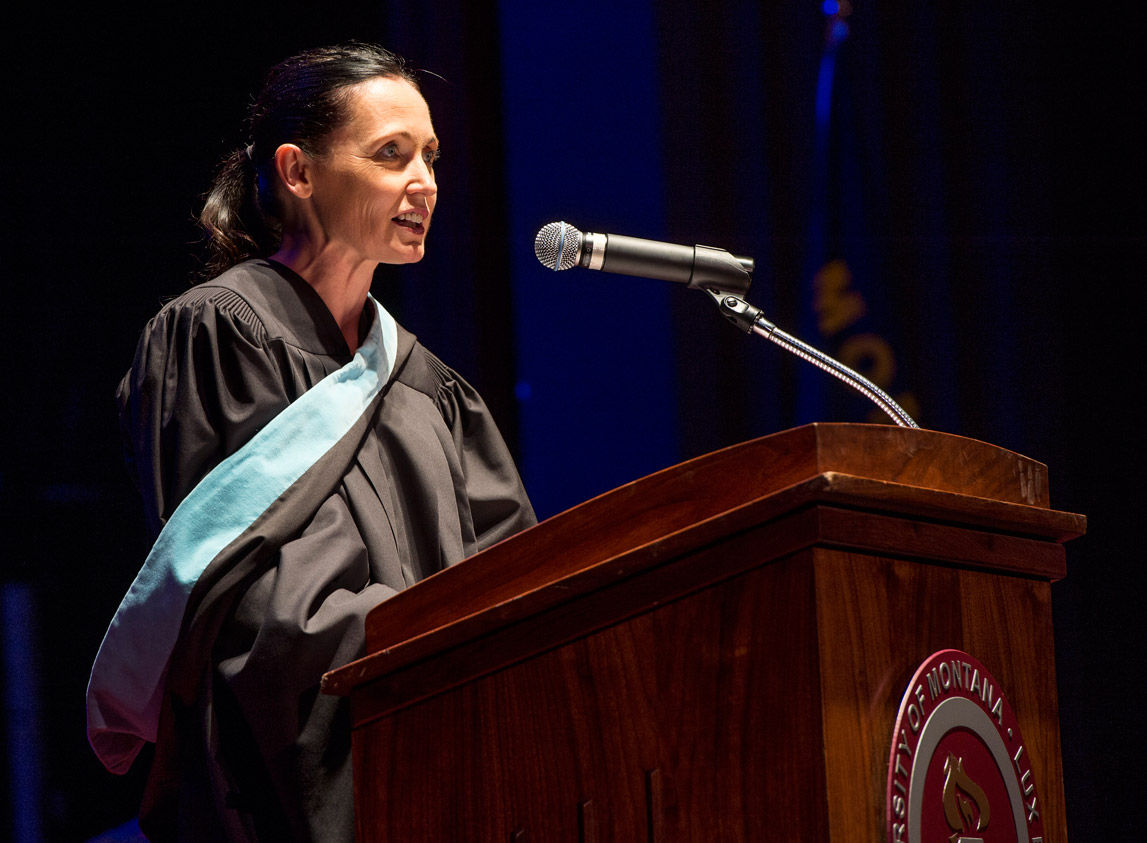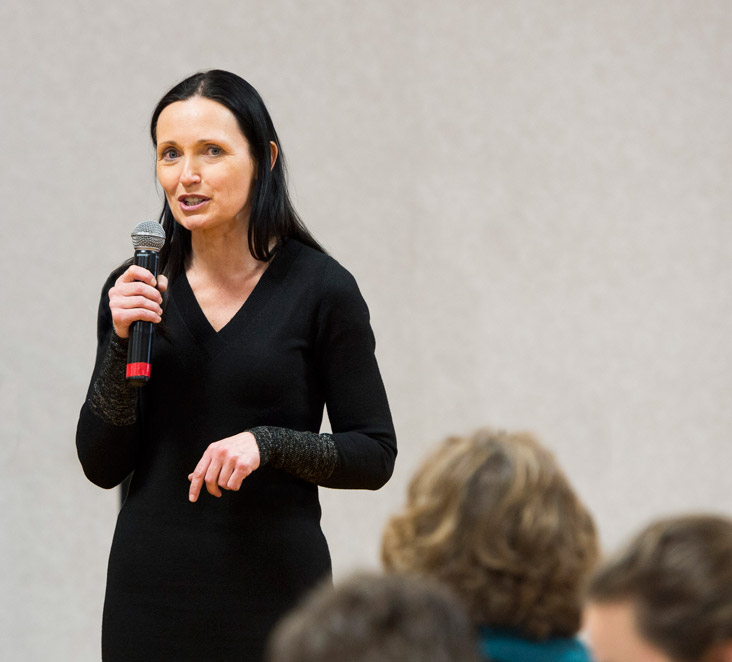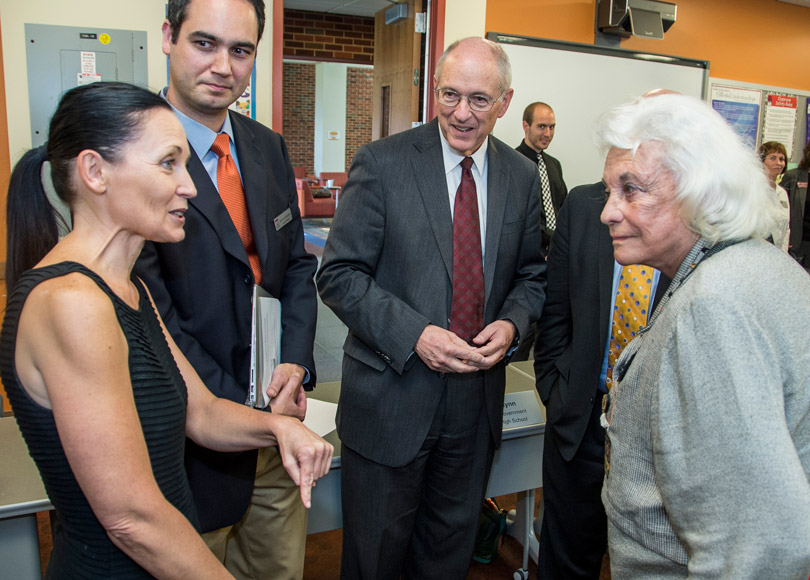- Editorial Offices
- 325 Brantly Hall
- Missoula, MT 59812
- (406) 243-2488
- themontanan@umontana.edu
- Icons By Maria Maldonado
UM Alumna Angela McLean Dives Head-First into Politics




It’s a title she’s still getting used to: Montana Lieutenant Governor Angela McLean.
“When I hear people call me lieutenant governor,” she says, “I still just kind of blush and shake my head and smile, because I don’t think that it has sunk in yet.”
It’s understandable, perhaps because it’s only been a few days since Governor Steve Bullock chose McLean to be his right-hand woman. It’s also understandable because of the significance of her leap into politics. One day she was a teacher at Anaconda High School, and the next, she’s the lieutenant governor of Montana.
But that doesn’t mean she’s not qualified for the position. McLean, who earned her master’s degree in curriculum and instruction from the University of Montana in 2000, has been an educator for close to twenty years. She served on the Montana Board of Public Education. She’s been a member of the Board of Regents, most recently serving as its chair.
“From humble beginnings in Twin Bridges, Angela has proven over and over again that if someone works hard and has the support of their friends and community, the sky is the limit,” Bullock says. “As parents of school-age kids, Angela and I know that there is nothing more important than a quality education—it’s the proven path to job creation and economic growth—and it’s the top priority of my administration. Angela will be a strong partner in making sure our schools and colleges are giving our students the tools they need to build an even brighter future for our state.”
A unique chain of events opened the door for McLean’s latest opportunity. President Barack Obama chose Montana Senator Max Baucus as the U.S. ambassador to China, leaving his Senate seat open. Once Baucus’ new role was confirmed, Bullock then tabbed his lieutenant governor, John Walsh, to replace Baucus in Washington, D.C. That left a vacancy in the lieutenant governor’s office, and Bullock sought McLean for the job.
McLean and her husband, Mike, a 1997 graduate of the UM School of Law, have two children: Colin, an eighth-grader, and Ellen, who’s in fourth grade.
In her first interview as Montana’s lieutenant governor, McLean stopped by the Montanan office to talk about her new gig, teaching, and meeting former U.S. Supreme Court Justice Sandra Day O’Connor, among other topics.
Can you tell us how you got this position? Was it something that you were interested in?
I can tell you that since I was a high school student I’ve been interested in politics, and I actually served as a legislative page for State Representative Robert Hoffman from down in the Ruby Valley. When this particular position looked like it might be shaking out, it wasn’t really anything I had thought about or considered. So when Governor Bullock approached me about giving it consideration, I was very humbled and very surprised.
Where were you when you found out, and what were your initial feelings?
The governor called me last Thursday night [Feb. 6] after the U.S. Senate had confirmed Senator Baucus to the ambassadorship, and the vacancy did exist then for the governor to make an appointment of then-Lieutenant Governor Walsh to Senator Baucus’s post, and he asked if I would take this post. And I sat quietly, and considered just exactly what had been put on the table for me, and then answered, “Yes, I’d be happy to work with you, Governor.”
Who did you tell first?
My husband, Mike. And he’s pretty excited. He now proudly calls himself the Second Dude.
Was it an easy choice to accept this position?
The acceptance of the position was very easy. I’ve dedicated my career in service to Montana students, and I recognized that the transition to this role meant that I would be able to dedicate the next few years of my career in service to all Montanans, which was an opportunity that was very exciting and brand new. And that made the choice somewhat easy. Some of the details that had to be considered about the decision, like what it meant for my family, most importantly, were not difficult, but they were things we never talked about before. So ultimately when the choice was made, it was something that my entire family came on board with and they agreed that it was the right thing to do.
What does the lieutenant governor do? What are some of the responsibilities?
This was part of the conversation that the governor and I had. I told him that I think this position was one that really leant itself to be molded by the person who held it. I indicated to him that I wanted to be at the table when policy was shaped. I told him that I wanted to be a part of the decision making, and that if he saw fit, I’d like to be the liaison or the ambassador for one or two initiatives. I don’t want to be a fly on the wall. I want to be somebody who rolls up her sleeves and has a meaningful voice and a seat at the table, because I think that’s what Montanans are expecting, and that’s what I need to provide for all of them.
With you being an educator, and we know that education is one of Governor Bullock’s priorities, how are you going to help further education in your new role?
That is a really good question. I have close to twenty years in education. I served on the Board of Public Education and most recently as chair of the Board of Regents, and I think I bring a couple of things to the table as a result of those experiences. First of all, I already have met the stakeholders in my community and partners across the state. I’ve worked with people from each of the Montana University System campuses. I’ve worked with folks from the School Administrators of Montana to the Montana Rural Education Association to the MEA-MFT group, and I hope that through those relationships I can help all of the governor’s education initiatives move forward. I think that so much of what we do in Montana is about building strong relationships, and I think that those relationships in the education arena already exist. And to some degree, relationships and partnerships with folks in the private sector already exist to make sure that we’re able to, as an administration, help move the dial forward.
What’s your favorite spot to eat at in Missoula?
The Mo Club
What’s the best concert or play you’ve seen at UM?
I saw the play Oklahoma when I was teaching in Arlee, and that was wonderful.
What’s your most memorable sporting event at UM?
Any time we’ve gotten to watch former students play. It’s always really rewarding to see them. They’ve been such good role models for the students in Anaconda. So any time we’ve gotten to root for them.
Have you ever hiked the M?
Yes.
What’s your favorite movie?
Seabiscuit or Secretariat
What’s your favorite book?
I have just finished up with the Diana Gabaldon series. It’s a Scottish Highlander series. I think that series is great, and she’s going to release a new book in June and I can’t wait.
What’s on your iPod?
1980s music
What do you like to do in your free time?
In the winter, it’s largely spent following my kids playing basketball and being with my family and my kiddos. In the summertime, we are out camping. We camp in Glacier, we camp in Yellowstone, we hike, we have campfires. It’s the highlight of our lives, just being outdoors and spending time with our crew.
This seems like a big jump into politics. Can you talk about this leap?
This is an entirely big jump into politics. I went from being a classroom teacher on Friday to being the lieutenant governor on Monday. I’ll tell you that I was considering, perhaps, a run for superintendent of public instruction in 2016. Statewide offices were something that I considered, and I did, perhaps, see myself in one of those seats. I can’t honestly say that lieutenant governor is one of those seats, although I feel entirely blessed that it is where I’m at today. When the governor approached me about the position, it was an opportunity I couldn’t pass up, and I am very excited about it. I feel like the governor has a great agenda that’s going to serve middle-class Montanans, and I think that I provide a good voice for the advocacy of all the folks, of all the workers, of all the students across the state. While this may not have been the one office I had identified myself with initially, I think this is the one that God wanted me to have right now.

What was your experience like serving on the Board of Regents, first as a member and then as its chair?
My experience on the Board of Regents was entirely rewarding and a true educational experience. I was appointed to the board in January 2010, and I was elected chair of the board in January 2012. At that January 2012 meeting, we had moved to hire the former chair, Clay Christian, as our commissioner of higher education. That was one of the best decisions I ever had the chance to make at that board table. He is an extraordinary commissioner. Since that time I’ve had the opportunity to serve as the board chair and to work with my fellow board members in moving the agenda forward. I can point to a couple of things. We worked with the commissioner, we worked with Governor Bullock’s office, and we worked with the Legislature to get historic investments in the Montana University System last session. We’re a part of Complete College Montana, and we froze tuition. So my experience on the board, in a nutshell, was challenging and fantastic, all at the same time.
How will those experiences help you in the lieutenant governor role?
A couple of things I would point to specifically from the board table was that I developed strong leadership skills and a thick skin, which I will need in this post and in any other post that I may have the opportunity to serve in the future. There were some challenging times when I served on the Board of Regents, and at the end of the day I think that we navigated them as well as anyone could have navigated them. I think that I am a better person, and I think the system is better because of the challenges we faced.
Where did you begin your career in education?
I began teaching just up the road in Arlee in 1994. My husband had been admitted to UM’s law school and I got my job in Arlee in the same month. So while he went to law school, I commuted to Arlee for three years. It was an extraordinary opportunity, and I loved it. I enjoyed my colleagues, I had great mentors there, and it was a great place to learn how to make sure that I could, through what I did in the classroom, impact the lives of students.
So from there you went to Anaconda?
From there I went to Anaconda in 1997, and I stayed.
What classes did you teach at Anaconda High School?
Over the years I have taught honors American government, honors American history, psychology, sociology, and economics. And most recently I was the curriculum coordinator for the school district. During my tenure in Anaconda I can tell you we had some pretty good opportunities. The Montana Supreme Court came for oral arguments there in 2004, and my students have competed year after year in the We the People competition. I’m very proud of the work I got to do in the classroom in Anaconda and very proud of the folks that I got to do it with. And I could not be more proud of the students that have graduated from there and represented not only Anaconda High School, but our community.
What do you love about teaching?
I’ve thought about that a lot the last couple of weeks. I think it’s the magic of when the student goes, “I get it.” Like when I took my students to We the People a couple of weeks ago for their state competition, the whole day was a moment for them to shine and to show me and to show themselves, more importantly, just exactly what they knew. I know that when they had those “a-ha” moments, what they learned went from their head to their heart, and they were never going to forget it. When those students take what they learn and apply it, that’s magical, and that’s what I love about teaching.
What are you going to miss about teaching?
All of those “a-ha” moments. I’m going to miss the energy of a typical day in the classroom. These kids are our future. I took note every single day that when students entered my classroom, they were going to be the ones taking care of you and me well into the future. They will be providing our medicine, taking care of our legal questions, and doing all kinds of things on our behalf. And I can tell you that we are in good hands. So I am going to miss knowing that I had a direct impact on that student preparation.
This past fall you got to bring a group of Anaconda High School students to UM to meet with former U.S. Supreme Court Justice Sandra Day O’Connor. What was that experience like?
That was an incredible opportunity getting to meet Justice O’Connor. More importantly, I think getting to see my students meet Justice O’Connor was pretty darn powerful. It’s not every student who can say they’ve met a former justice from the United States Supreme Court. What was equally exciting that day was that the students got to present a little bit about their history in Anaconda and campaign finance law, and how campaign finance law in Montana was shaped by what happened in Anaconda. And they understood it. They could make meaning of that for folks who weren’t aware of the history. And I hope they made meaning of that history to Justice O’Connor because it’s interesting to them and to all of the folks of the Anaconda-Deer Lodge Valley. So that was a real highlight.
How did getting your master’s degree help you get to where you are now?
I think that anytime we elevate or increase our education, I think we increase opportunities. I think that’s why the governor has such a huge emphasis on education because it translates into a better life and better opportunities. So what that meant for me is that I had a better understanding of state standards, which prepped me for the Board of Public Education, and it meant that I had a better understanding of curriculum, which prepped me for my job in curriculum and instruction. It opened doors that might not have been otherwise opened for me.
I also had extraordinary professors. Inspirational professors. And I would say that to a large degree the work I’ve done since 2000 in the classroom was largely inspired by my studies in my master’s program. I have great appreciation for all the folks on this campus, at UM Western, and at Montana Tech who provided that education and made investments in me, and students like me across the system. Their work doesn’t go unnoticed. I don’t think any of us evolve without folks making investments in us.